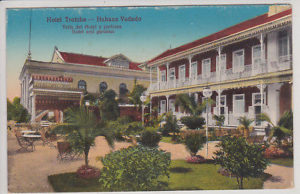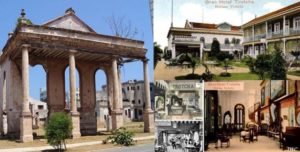The winds that announced the proximity of Hurricane Irma ended up taking away what little was left of the Hotel Trotcha, in Vedado. Witnesses would say that they saw how the precarious classicist colonnade of the façade of the establishment teetered, which, in the midst of an anguished roar, did not take long to come down, and arrive with their rubble on the opposite sidewalk.
Still in the tourist guides of Havana corresponding to the 50s of the last century, the hotel Trotcha appeared in Calzada, corner 2. Most of the time, the part of the installation that provided the lodging service disappeared and subsisted the local of the called hall, already turned into cuartería.
Bonaventura Trotcha y Formaguera was the founder of the hotel that bears his name. He was born in Arenys de Mar, Catalonia, and died in Havana on May 4, 1910, after some 70 years of permanence on the island. He was a lover of Vedado; the man who made it possible for the water of the aqueduct of Albear to reach the neighborhood.
The sale of land was slow in Vedado. By 1870 there were only about 20 houses, almost all in Line and on Calzada Street. Dr. Antonio González Curquejo was one of the pioneers. In 1880 he built a residence on the corner of Line and B that still stands miraculously on its feet. Also the Labarrere family, who in 1891 built their house in 3rd. between Paseo and A, in front of the Engineers Corps. That house, with slight modifications, is still inhabited, as far as we know, by the same family.
Until 1895 there was a remarkable development in the village of El Vedado. The proximity of the sea made the neighborhood relevant. On the coastline, from G to 6, several spas were established from 1864 onwards. E Street was popularly known as Baños, because it led to the pocetas of the El Progreso spa. Very close to the Trotcha, in what today would be Malecón and Paseo, were the Carneado baths.
Gone With the Wind.
According to the writers of the time, Julian del Casal and Renée Mendez Capote described the beautiful and sumptuous building then: The Hotel Trotcha “was assembled at the height of” the best hotels in Europe “; a place that attracted children by its crocodile farm and the ladies by its gardens, where they excelled hydrangeas, dahlias, forget-me-nots, ixoras, gardenias, violets … “Within this enchanting place, in recent years, numerous buildings, built to modern and of different proportions. The largest of all is the Trotcha room, the name of its owner. In the first years it has been the meeting point of the seasoners, and it has become a magnificent hotel, similar to those of Nice, Cannes, San Sebastian and other spa towns. ”
The iron gate was crossed, the leaves kept permanently open, and the visitor entered the garden of the Hotel Trotcha. It was called the Garden of Eden because it was located next to the so-called area of the establishment. In the angles of the garden were four spacious gazebos under whose shadow the guests rested and savored their favorite drinks.
The area intended for accommodation was made of wood. The living room consisted of two floors. In the first, at the level of the garden, was the restaurant, a long hall, surrounded by refined cabinets. There were gathered, on the holidays, numerous Havana families, belonging to the highest social classes.
Julian del Casal pointed out in his chronicle: “Everything seems to invite to satisfy the most imperative of human needs. The elegant tables, covered with white tablecloths; the plates of fine porcelain, fillets of golden stripes; the exquisite delicacies, served in silver fountains; the profusion of liquors, enough for all the whims; and the finesse of the owners who go out of their way to please their supporters make this place chosen by people with refined tastes “.
The restaurant was left behind and climbed up a wide marble staircase, surrounded by a green railing. Once the lintel was crossed, one entered a room decorated with carved furniture, Venetian mirrors, sumptuous carpets, Japanese vases and tables covered with bibelots. “This room has the appearance of an English parloir,” commented Casal. They followed the rooms of the guests, luxuriously decorated.
Splendor of the ruins.
«Everything happened when it was already past», exclaims José Lezama Lima in one of his most famous poems.
There is nothing left of that hotel. Not even his classic colonnade that challenged time in a privileged corner of Havana until the winds of Hurricane Irma. He will continue to live in the imagination of the people of Havana who prefer the splendor of ruins to the constructive bad taste of the new rich.
“I would say that the era of abandonment to an entire nation destroyed it little by little, without witnessing the times and improvements of our country’s splendor.” Irma came to finish what an unfortunate time in our country had already done its destructive part .
A work of splendor that only the historian of Havana Leal noticed and wanted to fix already too late”(AV).
“More important for the national elitist duel was the Angolan war, the collusion with the Soviets, the intrusion into the internal affairs of other countries to impose a system similar to the one that partially destroyed the” Hotel Trotcha. “It is painful to acknowledge it, but the History is written and the guilty, without remorse, are already occupying their places in the cemeteries of the whole country, our beautiful Cuba, they played with the History of an imperfect but splendid nation”(AV).
HOTEL TROTCHA, LA HABANA: ESPLENDOR EN RUINAS, LO QUE EL VIENTO SE LLEVÓ.
Los vientos que anunciaban la cercanía del huracán Irma terminaron por llevarse lo poco que quedaba ya del “Hotel Trotcha”, en el Vedado. Testigos referirían que vieron cómo se tambaleaba la precaria columnata clasicista de la fachada del establecimiento que, en medio de un estruendo angustioso, no demoró en venirse abajo, y llegar con sus cascotes a la acera de enfrente.
Todavía en las guías turísticas de La Habana correspondientes a los años 50 del siglo pasado, aparecía consignado el hotel Trotcha, en Calzada, esquina a 2. Más acá en el tiempo, desapareció la parte de la instalación que daba servicio de alojamiento y subsistió el local del llamado salón, convertido ya en cuartería.
Bonaventura Trotcha y Formaguera fue el fundador del hotel que llevó su nombre. Nació en Arenys de Mar, Cataluña, y murió en La Habana el 4 de mayo de 1910, luego de unos 70 años de permanencia en la Isla. Fue un enamorado del Vedado; el hombre que posibilitó que el agua del acueducto de Albear llegara a la barriada.
La venta de terrenos fue lenta en el Vedado. Hacia 1870 existían solo unas 20 viviendas, casi todas en Línea y en la calle Calzada. El doctor Antonio González Curquejo fue de los pioneros. En 1880 construyó en la esquina de Línea y B una residencia que aún se mantiene milagrosamente en pie. También la familia Labarrere, que en 1891 construyó su vivienda en 3ra. entre Paseo y A, frente al Cuerpo de Ingenieros. Esa casa, con ligeras modificaciones, sigue habitada, hasta donde sabemos, por la misma familia.
Hasta 1895 hubo un desarrollo notable en el caserío de El Vedado. La cercanía del mar hizo que el barrio cobrara relevancia. En la línea de la costa, desde G hasta 6, se establecieron, a partir de 1864, varios balnearios. La calle E fue conocida popularmente con el nombre de Baños, porque llevaba a las pocetas del balneario El Progreso. Muy cerca del Trotcha, en lo que hoy sería Malecón y Paseo, estaban los baños de Carneado.
Lo que el Viento se llevó.
Segun los escritores de la epoca, Julian del Casal y Renée Mendez Capote describieron al bello y suntuoso edificio entonces así: El Hotel Trotcha “estaba montado a la altura de «los mejores hoteles de Europa”; un sitio que atraía a los niños por su criadero de cocodrilos y a las damas por sus jardines, donde sobresalían hortensias, dalias, nomeolvides, ixoras, gardenias, violetas… «Dentro de este sitio encantador, se han levantado, en los últimos años, numerosos edificios, construidos a la moderna y de diversas proporciones. El más grande de todos es el salón Trotcha, nombre igual al de su propietario. En los primeros años ha sido el punto de reunión de los temporadistas, y se ha convertido en magnífico hotel, semejante a los de Niza, Cannes, San Sebastián y otras ciudades balnearias».
Se traspasaba la verja de hierro cuyas hojas se mantenían permanentemente abiertas y el visitante accedía al jardín del hotel Trotcha. Era el llamado Jardín del Edén por hallarse ubicado junto al área así denominada del establecimiento. En los ángulos del jardín se encontraban cuatro glorietas espaciosas bajo cuya sombra descansaban los huéspedes y saboreaban sus bebidas predilectas.
El área destinada a alojamiento era de madera. El salón se componía de dos pisos. En el primero, al nivel del jardín, se hallaba el restaurante, un largo salón, rodeado de refinados gabinetes. Allí se daban cita, en los días festivos, numerosas familias habaneras, pertenecientes a las más altas clases sociales.
Apuntaba Julián del Casal en su crónica: «Todo parece que convida a satisfacer las más imperiosas de las necesidades humanas. Las mesas elegantes, cubiertas de blancos manteles; los platos de fina porcelana, fileteados de rayas doradas; los manjares exquisitos, servidos en fuentes de plata; la profusión de licores, suficiente para todos los caprichos; y la finura de los dueños que se desviven por complacer a sus favorecedores hacen que este lugar sea el escogido por las personas de gustos refinados».
Se dejaba atrás el restaurante y se ascendía por una ancha escalinata de mármol, rodeada de una baranda verde. Franqueado el dintel, se entraba a un salón ornado de muebles labrados, espejos venecianos, alfombras suntuosas, jarrones japoneses y mesas cubiertas de bibelots. «Este salón tiene la apariencia de un parloir inglés», comentaba Casal. Seguían las habitaciones de los huéspedes, lujosamente decoradas.
Esplendor de las ruinas.
«Todo pasó cuando ya fue pasado», exclama José Lezama Lima en uno de sus más célebres poemas.
Ya no queda nada de aquel hotel. Ni siquiera su columnata clásica que desafiaba al tiempo en una esquina privilegiada de La Habana hasta que se la llevaron los vientos del huracán Irma. Seguirá vivo en el imaginario de los habaneros que preferimos el esplendor de unas ruinas al mal gusto constructivo de los nuevos ricos.
“Yo mejor diria que la epoca de abandono a toda una nación lo destruyo poco a poco, sin compadecerce de tiempos y mejoras epocas de esplendor de nuestra patria. Irma vino a terminar lo que una desdichada epoca de nuestra nación habia hecho ya su parte destructiva.
Una obra de esplendor que solo el historiador de la Habana Eusebio Leal notó y ha querido arreglar ya demasiado tarde”.(AV)
“Mas importante fueron para la cupula elitista nacional la guerra de Angola, el contubernio con los sovieticos, la intromision en los asuntos internos de otros paises para imponer un sistema parecido al que parcialmente destruyó al “Hotel Trotcha”. Es penoso reconocerlo, pero la historia esta escrita y los culpables, sin remordimientos, ya van ocupando sus lugares en los cementerios de todo el pais, nuestra bella Cuba. Jugaron con la Historia de una nación imperfecta pero esplendorosa” (AV).
Agencies/Ciro Bianchi/Extractos/Internet Photos/Arnoldo Varona (AV), Editor/ TheCubanHistory.com
THE CUBAN HISTORY, HOLLYWOOD.










